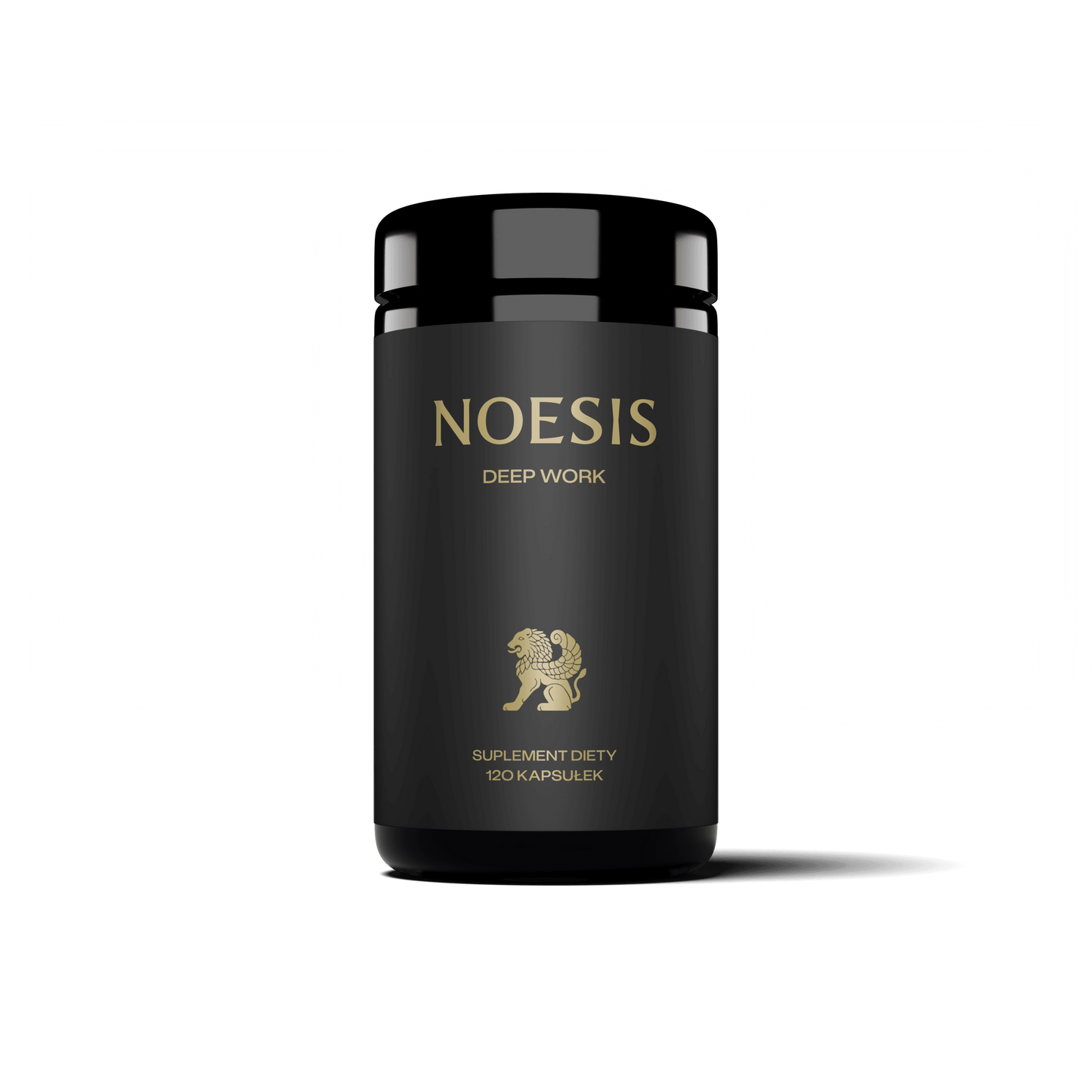
Immunity drops, sleep doesn't regenerate, and energy disappears faster than coffee works? This may not be “material fatigue,” but a signal that your cortisol level, the stress hormone, has long since gotten out of control. Cortisol is not your enemy, as long as you keep it in check. However, when its levels are elevated for too long, it starts to work against you: it disrupts your mood, destroys your muscles, increases your glucose level, and finally takes away your focus, peace and efficiency .
In this article you will learn, among other things:
· what exactly is cortisol and how does it work in your body,
· what happens when cortisol levels are too high,
· how to test its levels and interpret the results,
· How lower cortisol naturally , without resorting to drastic measures,
· which dietary supplements can support the body in stress – realistically, not marketing-wise.
Cortisol – what is this stress hormone?
Cortisol is a steroid hormone produced by the adrenal cortex. It is part of a larger system: hypothalamus-pituitary-adrenal glands (HPA axis) , which regulates the body's response to stress. Its task is prepare the body for action in dangerous situations: speed up the reaction, provide energy, mobilize the nervous and immune systems. In short: triggers the "fight or flight" mechanism.
The role of cortisol in the body:
· increases blood glucose levels (for quick energy),
· affects the metabolism of proteins, fats and carbohydrates,
· regulates blood pressure, sleep and cognitive functions,
· modulates the immune response, soothes inflammation.
Why is it called the stress hormone?
Because its level increases rapidly in stressful situations, both physical (e.g. physical exertion) and mental (pressure, tension, anxiety). This is a natural reaction, the problem begins when stress lasts too long and cortisol does not return to normal.
Cortisol is not the enemy as long as it is in balance
In physiological amounts, cortisol:
· supports concentration and performance under pressure,
· regulates the circadian rhythm (supports waking up and falling asleep),
· mobilizes the body for action and regeneration.
But when cortisol levels remain chronically elevated – could start to do serious harm. More on that in a moment.
Adrenocorticotropic Hormone – Who Manages Cortisol?
Cortisol does not produce itself. Its presence in the body is the responsibility of a precisely programmed hormonal control system. The key link in this puzzle is adrenocorticotropic hormone (ACTH) .
The Role of ACTH in Cortisol Regulation
ACTH is produced by pituitary gland , which responds to signals from the hypothalamus – the “command center” of the nervous system. When the body receives a stress signal:
1. The hypothalamus secretes CRH (corticotropin-releasing hormone),
2. CRH stimulates the pituitary gland to secrete ACTH,
3. ACTH goes to the adrenal glands and activates the production of cortisol.
This a hormonal cascade that works quickly but can also be prolonged if stress does not subside.
The adrenal glands and the pituitary gland – a harmonious duo under tension
The adrenal glands are small glands above the kidneys that play a huge role – they produce not only cortisol, but also adrenaline, aldosterone and other hormones responsible for regulating blood pressure, metabolism and immunity. But without the pituitary gland – they do not function. HPA axis (hypothalamic-pituitary-adrenal) is a system that determines how strongly the body will respond to stress. If it is working properly, cortisol increases when needed and decreases when it is no longer needed.
HPA axis disorders = hormonal chaos
Long-term stress, lack of sleep, excess caffeine, nutrient deficiencies can all disrupt the pituitary and adrenal glands. The effect? Or continuous production of cortisol , or on the contrary – its deficiency and extreme exhaustion nervous system. That is why balance is so important – not only in action, but also in regeneration.
Cortisol in the blood – what is its natural rhythm?
Cortisol has its circadian rhythm . This means that its level it changes throughout the day , and is not constant. It is these fluctuations that allow us to wake up, act and regenerate. The problem begins when this rhythm is disturbed, for example, by stress, lack of sleep, an unhealthy lifestyle.
Highest cortisol concentration – morning
Cortisol reaches peak between 6:00 and 8:00 a.m. then it prepares the body for action: increases blood pressure, glucose and energy levels. It's thanks to him we wake up – naturally, without the need to use an alarm clock (at least in theory).
Daytime drop – system quieting down
After the morning peak, cortisol levels gradually drops throughout the day , reaching its lowest level in the evening – allowing the body to enter a state of regeneration. Thanks to this it is easier to fall asleep, calm down and repair micro-damages from the whole day.
What can disrupt the circadian rhythm of cortisol?
· Too little sleep or falling asleep late,
· shift work , jet lag, irregular eating hours,
· constant stress and overstimulation ,
· excess caffeine, alcohol, stimulants ,
· no exposure to daylight in the morning (e.g. for people working in dark rooms).
If cortisol levels are still high in the evening – this can lead to:
· problems falling asleep,
· waking up at night,
· morning tiredness, despite hours of sleep.
This is a signal that something has gone wrong.
Cortisol test – how to check its level?
Cortisol can be tested and is worth doing if you notice chronic fatigue, problems with mood, sleep, immunity or body weight. The tests give specific numbers, but the key lies in their proper interpretation.
What are the methods for testing cortisol?
1. Cortisol in the blood – the most common form of testing.
about Taken in the morning (between 6:00 and 10:00 AM) when levels should be highest.
about The result shows the current cortisol concentration but does not reflect the full circadian rhythm.
2. Cortisol in saliva – a method used more and more often.
about It allows you to assess the level free cortisol (active faction).
about You can make several samples in a day best way to assess cortisol rhythm .
3. Urinary cortisol (24-hour) – less frequently used.
about Provides a picture of total cortisol production over a 24-hour period.
about May be useful when serious hormonal disorders are suspected.
Reference values – what is the norm?
The standards depend on the laboratory and testing method, but as a guide:
· Serum cortisol (morning): 140–700 nmol/l,
· Values below normal may suggest adrenal insufficiency,
· Values above normal – chronic stress, diseases of the pituitary gland or adrenal cortex.
Do not interpret the results yourself – it is worth consulting them with a doctor.
Test packages – what is worth testing along with cortisol?
For a more complete picture, it is also worth doing:
· glucose and insulin ,
· CRP and inflammatory markers ,
· thyroid hormones (TSH, FT3, FT4) ,
· ACTH – if you suspect HPA axis disorders ,
· Vitamin D, iron, ferritin tests – deficiencies can also affect cortisol levels.
Symptoms of elevated cortisol levels - when is it worth reacting?
Cortisol itself is not bad but chronically elevated levels of this hormone can wreak havoc. Often we do not associate symptoms with the hormonal system, but with "difficult period" or "fatigue". And it is cortisol that may be the cause.
The most common symptoms of chronically high cortisol levels:
· difficulty falling asleep, light and interrupted sleep,
· morning tiredness despite a good night's sleep,
· increased appetite – especially for sweet and fatty foods,
· deposition of fat tissue around the face and abdomen,
· loss of muscle mass with constant body weight,
· frequent headaches, irritability, absent-mindedness,
· reduced immunity – frequent infections and longer healing,
· digestive problems – the intestines react to stress,
· increase in blood pressure, fluctuations in sugar levels, feeling of “tension” in the body.
What happens in the body with chronically high cortisol?
· Increased blood glucose levels – cortisol releases energy “quickly”, but with longer exposure it disrupts the sugar metabolism.
· Hormonal imbalance – influence on the thyroid gland, reproductive system, pituitary gland.
· Inhibition of the immune system – you are more susceptible to infections.
· Oxidative stress – more free radicals, faster aging of the body.
· Problems with recovery, sleep, mood and motivation – everything is falling apart.
This is the moment when your body tells you, "Hey, slow down. Or I'm going to shut myself down." That's not a metaphor - chronic excess cortisol can lead to adrenal fatigue , metabolic disorders, depression, and even heart disease.
How to lower cortisol levels in practice?
If you want to lower your cortisol levels – you don't need a revolution , just conscious habits. What you do every day has the greatest impact on your nervous system, regeneration and ability to cope with stress.
1. A good night's sleep is the foundation
· Sleep regularly – minimum 7–8 hours , preferably at the same hours.
· Avoid blue light (screens) at least 1 hour before bed.
· Air the room, make sure it is quiet and dark – this supports the production of melatonin and suppresses cortisol.
2. Moderate but regular physical activity
· Exercise reduces stress levels and stabilizes hormonal balance.
· The best are: walking, strength training, yoga, intervals – depending on form .
· Avoid long daily “training sessions” – too much effort = even more cortisol.
3. Relaxation techniques and regeneration
· Conscious breathing, meditation, sauna, massage, exposure to nature – these are not just fashionable trends. These are actions that physically lower cortisol levels .
· Introduce them in small doses – not all at once.
4. Daylight in the morning, no caffeine in the evening
· Light exposure within the first hour after waking up regulates the circadian rhythm and helps “set” cortisol where it needs to be.
· Limit coffee after 2pm – caffeine consumed too late disrupts sleep and prolongs the effects of cortisol.
5. Avoid constant stimulation – physically and mentally
· Constant scrolling, multitasking, pressure and overstimulation = constant stress.
· Make room for peace – even 15 minutes of silence a day makes a difference.
· You don't have to have it all figured out. Cortisol loves perfectionists—and it destroys them.
Dietary supplements that support the regulation of cortisol in the blood
There is no magic pill for stress, but there are natural ingredients that affect the nervous system, calm the adrenals and support regeneration . If your lifestyle is in order, good dietary supplements can make a real difference.
Adaptogens – plants that teach the body to cope with stress
· Rhodiola Rosea – regulates cortisol levels, improves resistance to mental and physical stress.
· Ashwagandha – has a calming effect, helps reduce its concentration and improves the quality of sleep.
· Bakopa, gotu kola, eleuterokok – support the functioning of the nervous and immune systems.
Adaptogens work gently but long-term it's not an energy boost, but a return to balance.
Vitamins and minerals
· Vitamin C – participates in the regulation of the HPA axis and the synthesis of cortisol. Its use increases in stress.
· Magnesium – magnesium deficiency increases the effects of stress. Supports the nervous system and mental regeneration.
· B vitamins – especially B6, B12, folic acid – support cognitive functions and mood.
· Zinc and selenium – have antioxidant properties, protect against oxidative stress.
What to look for when choosing a supplement?
· Composition: them the more transparent the better.
· Lack artificial additives, dyes, unnecessary fillers .
· Supplementation should be tailored to your lifestyle and needs – not copied from advertising.
· Pay attention to form of active substances (e.g. standardized extracts, not “leaf powders”).
Their effectiveness – what does the research say?
· Adaptogens show proven to lower cortisol levels ( including in randomized studies).
· Magnesium and vitamin C improve resistance to stress and shorten the time required to return to hormonal balance .
· They work best multi-ingredient formulas , where the elements complement each other (e.g. magnesium + B6 + adaptogen).
DEEP WORK – daily support for the nervous system
Not every supplement has to focus solely on one area to truly support the body under stress. Dietary supplement DEEP WORK is a comprehensive formula of 24 ingredients , designed for everyday functioning at a high pace - without false stimulation and without comedowns.
This supplement is for you if:
· you finally need to act without distraction,
· you need to act calmly and without constant tension,
· you need real regeneration and mental fitness,
· you want to act stably throughout the day,
· You care about a healthy mind and a strong nervous system.
In summary – cortisol under control
Cortisol is not a problem – as long as it works in accordance with the body’s rhythm. But when stress becomes a daily occurrence and regeneration is pushed to the background, its levels start to work against you. High cortisol = lower immunity, worse sleep, problems with mood and mental performance.
Remember that you don't need revolution to change that. Start with the basics:
· healthy sleep, daylight, physical exercise,
· avoiding overstimulation,
· real regeneration.
Because you can't eliminate stress, but you can learn to defeat it.







